Florence Kelly Roseman
Survived a 'Night of Terror'
Florence Kelly Roseman was born on February 20, 1925 in Cleveland. She is an only child. Both of her parents are Manx, being born on the Isle of Mann in the British Isles.
Florence went through the Maple Heights school system and graduated from Maple Heights High in 1942. She went to Dyke College of Business and went to work at The Gabriel Company where she eventually became secretary to the President until she left to raise her family. Her only child, daughter Mary, was born in 1959.
Florence met her husband William at a Bedford Methodist Church youth group. They were married September 11, 1948. Her husband, the love of her life, died of Lou Gehrig's disease. Florence has three grandchildren all of whom make her beam with pride by the mere mention of their names. 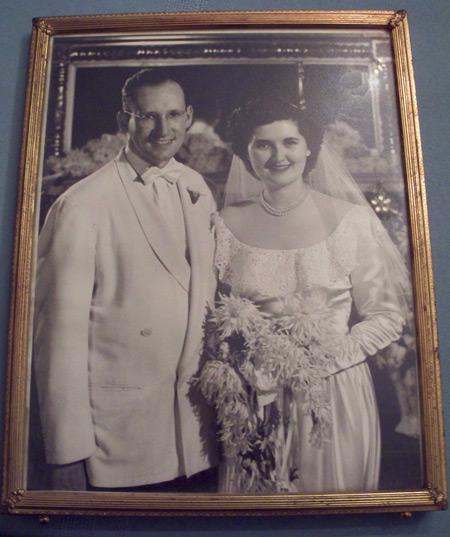
William and Florence Roseman wedding
After Florence had been retired from Gabriel for about three years, the president's daughter got married. He asked Florence to help with the wedding. She did such a wonderful job that he recommended her to others and she started a new career as a wedding and event organizer. She started in 1962 and since then she has planned hundreds of large, lavish weddings. Some of the guests included Tricia Nixon, Prince Charles and, Fred Crawford. She had since turned the business over to her daughter. 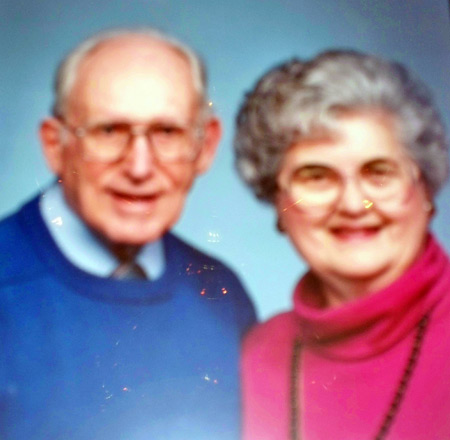
William and Florence Roseman
As interesting as this is, it is not the most interesting part of Florence's life. This is her story of what she calls "My Night of Terror."At the age of 14, Florence and her mother went to visit the relatives in the British Isles. It was the end of May, 1939. Her father's work kept him from joining the mother-daughter team on their adventure. Florence and her mother were passengers on the ocean liner the S.S. Athenia. The ocean liners of those days were smaller than the ones they build today but it was still a 14,000 ton ship. At that time ships were the main mode of transportation between Canada, the US, the British Isles and Europe. Florence was very excited to be spending the summer in the British Isles. She had a fabulous trip over and they arrived after 7 days of travel in Liverpool, England. Once there, a smaller boat took them to the Isle of Mann and from there they visited England, Scotland, Wales and Ireland. "It was a fabulous trip. Here we were coming out of the Depression and not many people travelled like this in those days. People travel everywhere today, but not as much in the thirties." 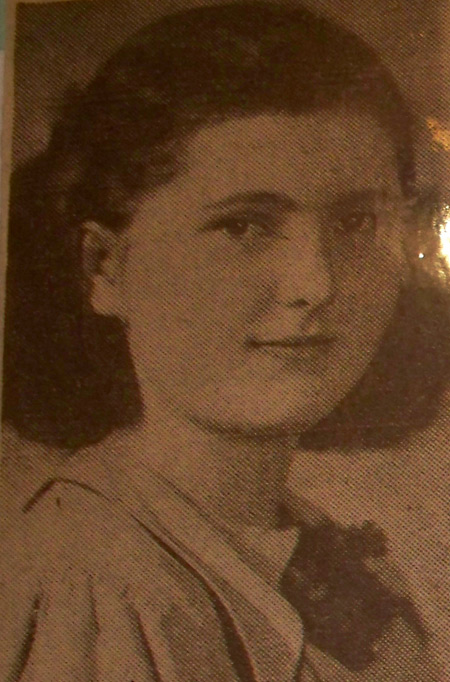
Florence Kelly
About the middle of that summer, Florence's father got hold of them and said "Hitler is causing so much trouble in Europe, you better try to get home earlier." They had had plans to come home in September but thought they had better try and heed her father's advice. The problem was that everyone over there at the time was trying to get back home to the United States and Canada. "Plus many hundreds and thousands of people were trying to escape from Germany. Jewish people were trying to escape. So all of the ocean liners were booked to capacity." Even libraries and recreation centers on board were turned into sleeping quarters so that additional passengers could be accommodated. Since they were not able to change their plans they stuck with the September 2, 1939 date they had already scheduled to return to North America on the Athenia. When they boarded they immediately realized things would not be the same as when they went over. "All the portholes and windows were painted black. There were signs all over saying there was no smoking allowed on deck. You couldn't smoke a cigarette or light a match on deck. When you went out a doorway you opened the doors and then there was a heavy drapery. You closed the door and part of the drapes when you went out so that no light would shine out on the deck at night."
Everyone knew there was trouble, and possibly even war, brewing. On September 1st Hitler had marched his troops into Poland. "England and France had been appeasing Hitler all summer but they finally said 'if you don't withdraw your troops from Poland, we will declare war on you."
Florence's trip was the night of September 2nd and by that time it was obvious, Hitler was not going to listen to England and France. Florence, being 14 years old, was not scared by everything going on. She says she was still in vacation mode and thought it was all a little exciting. Of course, the thought of war was not very real to this young girl. 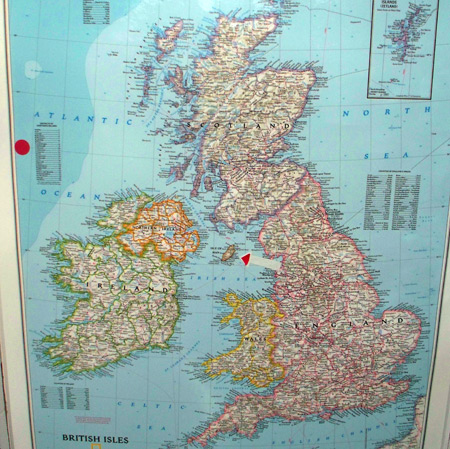
Map of the route of the Athenia (red arrow to red dot)
They travelled through the Irish Sea and into the Atlantic Ocean. Sunday morning they went to Church and right after the service the captain announced that England and France had indeed declared war on Germany. (September 3, 1939 - 11:00 a.m.)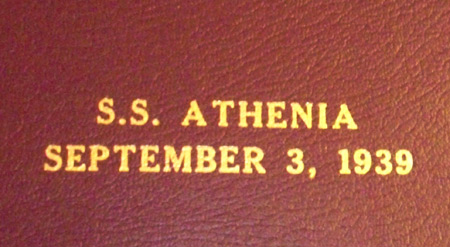
Although Florence and her mother felt bad for the family they left behind in Britain they themselves felt safe. They knew their dad was meeting them in Quebec when the ship landed so they thought they had nothing to worry about. That evening around 7:00 Florence's mother went to the lounge to read and Florence went to the deck to walk around. Just as she started to close the draperies she heard a tremendous explosion. "As I looked forward I saw a hatch and two people had been sitting on the hatch. They were blown up into the air and back down onto the ground - very black and very lifeless." Florence hung onto a railing to keep from falling onto the deck. The ship then rocked… and rocked… and rocked. Finally it stopped and "the whole ship seemed to shutter - and you could feel it sink just a little bit. Of course there was panic because nobody knew what was going on. " She thought they had been bombed by an airplane, but there was no airplane. "I never thought of a submarine."
All the electricity on the ship was off. Florence was right outside the lounge where her mother was. "I just waited for her because when I looked in it was pitch black. Finally my mother came out. She was a little lady and when the ship rocked she was thrown back and forth across the lounge several times."
In the process of being thrown around in the lounge her mother lost her purse, which had their money and passports in it. "But of course, we were all in the same boat."
Everybody had had a life boat drill in the morning, but they weren't allowed to go back to the cabins to get their life jackets because no one was sure how much damage had occurred there. A generator was used to make the P.A. system work and the captain announced that everybody should go to their life boat stations. When they got to theirs, there was already a boat about to be lowered. They were told there was room for one more but neither Florence nor her mother had any desire to be separated. So they decided to wait. 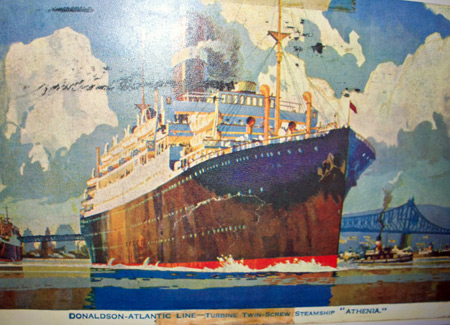
Twin-screw Steamship S.S. Athenia
"We were lucky because as they lowered that life boat a rope broke and they were dropped under the water. When it straightened itself out the people were all okay - nobody was killed or drowned but they were not only soaked with water but also with oil. So they were a mess to start."Florence and her mother were on one of the final life boats to leave the Athenia. "It was lowered very gently into the water and we were okay. But I can remember putting my hand in the water and thinking here we are right on the ocean. We had been high up on the deck before and now we were right on the ocean. "
The life boat held about 60 people. They had learned in the drill that the first job was to secure the oars, and Florence remembers them as very heavy. Florence helped another woman and along with a crew member (a dining room steward) they were able to get the oars in place. They had to row with all their might to get as far away from the Athenia as possible. If the Athenia started to sink the suction would have pulled all of the life boats under with it. They rowed as fast as they could, but of course speed was not really possible. Under the direction of the crew member they rowed until they were far enough away that they could see the ship with its few scant lights from the auxiliary generator. Their next job was to keep the nose of the life boat into the waves. "We were lucky. The waves were not white caps, but they were the rolling waves and this makes people sea sick. We had a lot of people sea sick." "Every once in awhile someone would start singing a hymn or they would say a prayer" but all-in-all Florence says the life boat was very quiet. Nobody was screaming or hysterical, though some, of course, were crying softly. 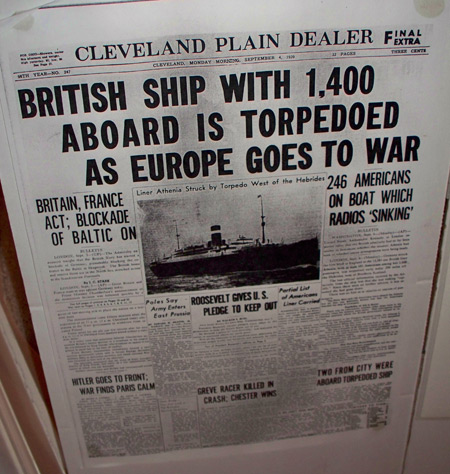
Cleveland Plain Dealer 9-4-1939
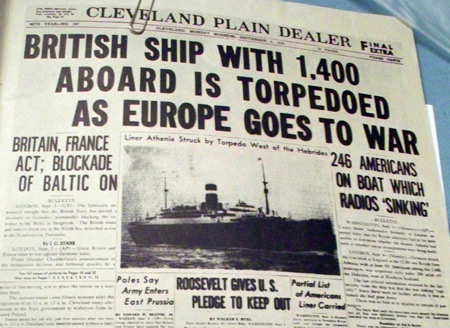
They spent the night - a full twelve hours - in the life boat. During that time it rained and they had to bail water out of the life boat with their shoes. "And it was cold. It was September in the North Atlantic. We were 350 miles from Ireland. "Finally, at daybreak, they were able to see four ships on the horizon. There was a Norwegian tankard, The Knute Nelson. "That was the first one to get our SOS. When our radio man sent the SOS the radio man on the Knute Nelson picked it up and went to his captain and said 'I've received an SOS from the British Liner the HMS Athenia, that they have been torpedoed and their ship is sinking.' The captain said 'that's a likely story, but tell them we're coming anyway.' They were the first ones to get there." In addition to the tankard there was The Southern Cross, a Swedish yacht and then two British destroyers. The people on the life boat weren't sure they had been seen because they were so far away, but soon they saw that the ships were, in fact, heading toward them. 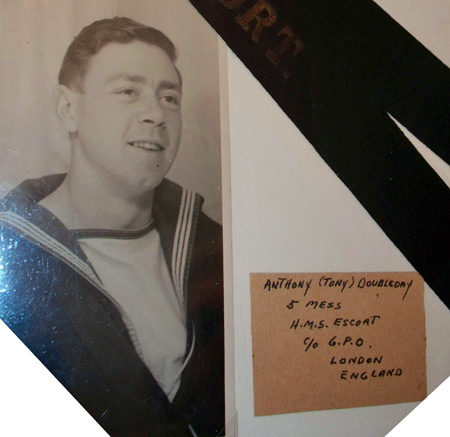
Tony Doubleday from the HMS Escort
The two British destroyers, The HMS Electra and HMS Escort, "came zigzagging...during the war that's the way the ships travelled so they were not a direct target for the submarines. And of course they knew there were submarines in the area."The ship got as close as possible and then lowered rope ladders. Florence describes the scene as having two sailors leaning over the deck holding the rope ladders. The two sailors would have surely fallen in themselves had it not been for two more sailors holding their feet to keep them on board. "One person would grab the rope ladder with their hands and get their feet on it. As soon as they did that these two sailors would grab us under the arms and pull us up on board." In addition to being concerned that no one had ever climbed a rope ladder before (which, of course, was true) the sailors were also concerned because the passengers had been sitting in a life boat in the cold for 12 hours and weren't sure if there would be mobility or function consequences. Getting caught between the life boat and the ship would have killed a person by smashing them up against the boat. So the sailors took no chances and were able to get everybody on board the Destroyer, safely. 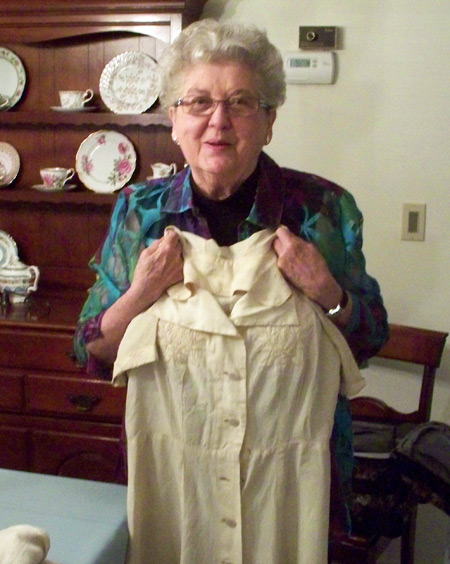
Florence Kelly Roseman with the dress she wore
"The sailors were so nice and couldn't do enough for us." The survivors were given tea, warm clothing and blankets and saw to their every need. To this day Florence has a pair of bell bottom pants given to her by one of the sailors because he knew how cold she must have been in her lightweight dress. (She still has the dress). 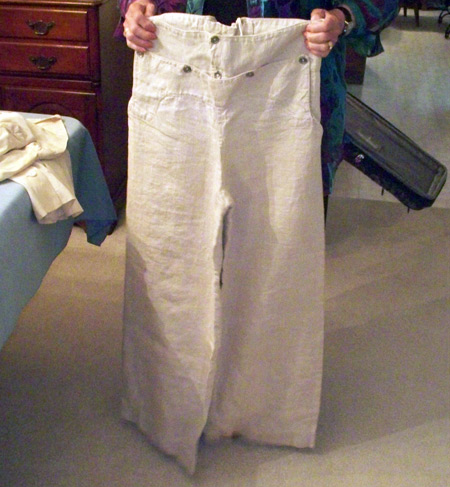
Bell Bottom pants given to Florence Kelly
This being 1939, women did not wear jeans or pants and certainly no walking shoes - they all wore dresses and "feminine-type" clothes and shoes.They stayed on the British destroyer for 26 hours and during that time they were chasing submarines and setting off depth-charges. The rescued passengers could hear the depth-charges exploding under the water. The destroyer took them back to Greenock, Scotland and then busses took them to Glasgow. It was then that Florence and the rest of the crew found out a few things they didn't know before. It turned out that when they first boarded the Athenia one of the passengers fell and hit her head and was taken to sick bay. When they landed in Scotland and met up with the other destroyer filled with Athenia survivors the crew asked if anyone had rescued the woman in sick bay and it was determined that they had not. Three sailors from the Athenia wanted to go back and get her, but the captain of the destroyer said no. "And guess who won? The three sailors. They got a motorized life boat that the destroyer apparently had. They went back to the ship and went up the rope ladder, which was a long one up the side of the ocean liner. They went to the sick bay and when they got down there they were knee deep in water and there was the lady lying there, unconscious." The sailors wrapped her in blankets, took her back down the rope ladder and back to the destroyer and eventually back to Scotland. She was taken to a hospital there, but sadly, died two weeks later, never having regained consciousness.
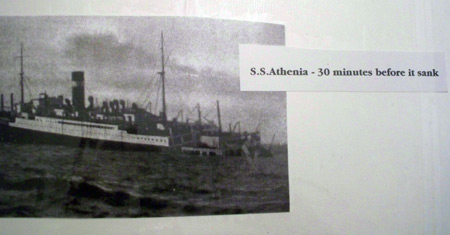
S.S. Athenia 30 minutes before sinking
They also found out that about forty people were killed during the rescue attempt by the Southern Cross when the engine was accidentally turned on and the lines to the boat were severed and the people drowned. It was now about three days since the attack and nobody had had word about the survivors. Her father was working with the US Congress to find out if they were okay. When they arrived, Joseph Kennedy, Ambassador to King James Court was there to meet them. A young John F. Kennedy was with him as well. They were taken to a department store to get clothing "all we had was what we stood in." Most of the people stayed in a hotel in Glasgow, but Florence and her mother were approached by a Mr. Henderson who said he wanted to take about six people with him to Buchannan Arms Inn, a five star hotel near Loch Lomond. They went there and stayed for about four days at the expense of the Henderson family. Florence developed an intense fondness for the Scottish people and government who opened their hearts and their wallets to the survivors. They absorbed the bill for food, clothing and shelter for about 600 people. The survivors were told if they had relatives in the British Isles they were cleared to go and stay with them. Florence's relatives were in the Isle of Mann, but no boats were running there so that was not an option. They also had relatives in Liverpool, so they went and stayed there, where they had to register for food stamps and get a gas mask. (Florence still has the gas mask to this day.) 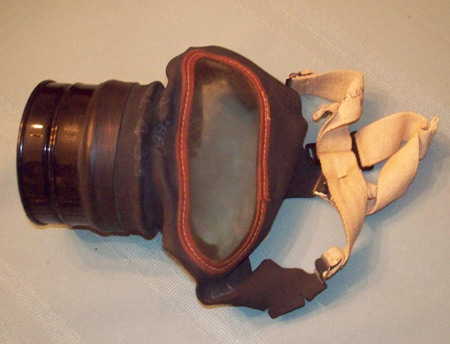
Florence's "souvenir" Gas Mask
Florence observes "The war was on for one week and everybody had a gas mask. They figured Hitler was going to use chemical or germ warfare, which he didn't, thank goodness." Everyone had to carry the gas mask with them at all times.
They stayed in Liverpool for about 10 days before getting word that the United States had sent a ship for them. Even though the Athenia was a British ship, there were so many American survivors the U.S. sent their own ship, The S.S. Orizaba. As their ship sailed through down the Clyde sailors working on other ships waived goodbye and wished them well. They stopped in Galway Bay to pick up additional survivors and then came straight across the Atlantic Ocean to New York City. The Orizaba was "lit up like a cruise ship" with the American Flag painted on the deck and the sides of the ship and the flag not only flying but with a spotlight on it. "They figured Hitler did not want the US in the war at that time." They had no problems on the trip home, although some people slept on the deck with their life jackets with them; afraid to go down into their cabins. Since they didn't have passports, they were issued special papers to allow them back into the country. Florence reflects further on her experience. "From the time war was declared to the time we were torpedoed was 8 hours. Now, no submarine could have traveled from Germany, whether they went up around the North Sea or through the English Channel, they could not have gotten 350 miles from land in the Atlantic Ocean in 8 hours. That was an impossibility." It is clear to Florence that Hitler used the time between England's threat and the declaration of war to get his submarines in place. 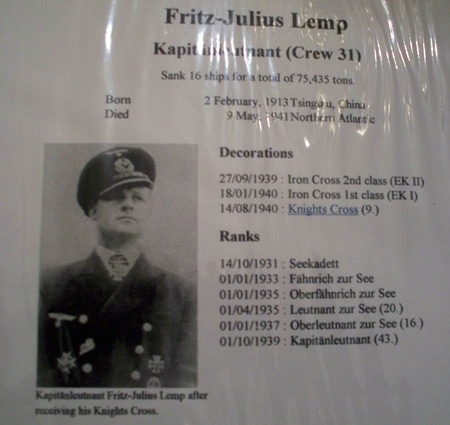
Captain Fritz Julius Lemp torpedoed the passenger ship
Captain Lemp, the captain of the German submarine, at first was concerned that he might be demoted because he had torpedoed a passenger ship. Even during a war, attacking a passenger ship is not tolerated. "They could have come on board to determine if we had ammunition." Instead of a demotion, however, some months later Captain Lemp was given a medal for having sunk the Athenia. A few months after that, he was commander of another submarine and the British sunk that ship. "They got him!" The Athenia stayed up for 14 hours. Two torpedoes hit and a third one malfunctioned. At one point the captain of the Electra considered firing on the ship to sink it completely knowing they could not leave it for German occupation. Not longer after the ship sunk completely. The Athenia has never been brought up - it is much too deep in the ocean. 130 people were killed in the attack of the Athenia. 28 of those were Americans. There were 1400 people on board the Athenia including the crew with 26 life boats, which was enough for over 1500 people. When they realized they were being saved the quiet group on board the life boat cheered and became understandably animated. While on the Escort they got to know some of the sailors and kept in touch with them for quite awhile. Unfortunately, the Escort was sunk in the Mediterranean and a lot of the sailors Florence came to think of as friends died on the ship. "We definitely cried then. We became attached to them in those 26 hours." A year or so after the ordeal Florence and her mother received a letter from the Canard lines, the owners of the Athenia, saying they wanted to compensate them for their loss. The loss of course included three months of their life, their pictures, clothing, luggage, and everything they had purchased while there. There was a check enclosed with the letter to cover the loss and expenses of Florence and her mother. The check was for $93.75. "Even in 1939 you wouldn't buy too much with $93.00" In 1947 Florence went back to visit her relatives. She took the QE from New York. Just outside of Southampton the mighty ship got stuck in the mud. They were there for two days while tug boats tried to pull them off. "Wouldn't you like to go on a ship with me?" Florence still prefers ships to flying. 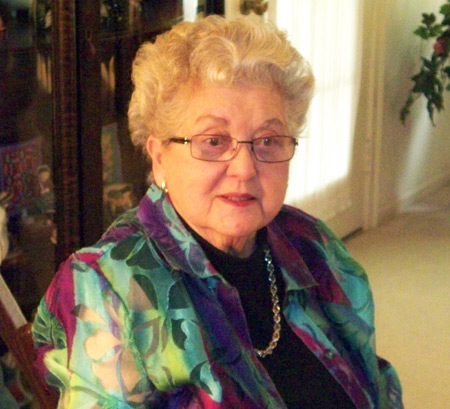
Florence credits her mother, and her general upbringing, with her survival. "My mother was a strong lady - gentle in many ways, but strong inside. We did have faith…. You have to do what you have to do. You didn't have much choice." She had been raised to be strong and rely on God and that is what they did.
The experience has had a profound effect on Florence's life - a very positive effect. She has a deep appreciation for every moment of her life from age 14 on, knowing that it could have all stopped right there. She realizes what good life she had; she had good parents, a good husband; my daughter is great and my grandchildren I adore." 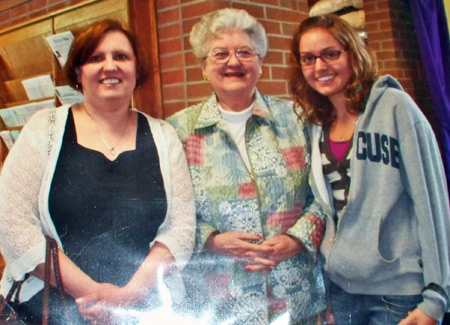
Florence Roseman with daughter and granddaughter
Florence has given about 130 talks on the subject and always gets wonderful reactions. "It's been fabulous! I never thought people would be interested in hearing it." Her talks have been at Lions Clubs, Schools, Kiwanis, Pioneers, Retiree groups and many other places. She brings maps with her as well as her collection of items including her dress, gas mask, bell bottoms and more. It is seldom that she gives the talk that someone in the audience does not ask to book her somewhere else. 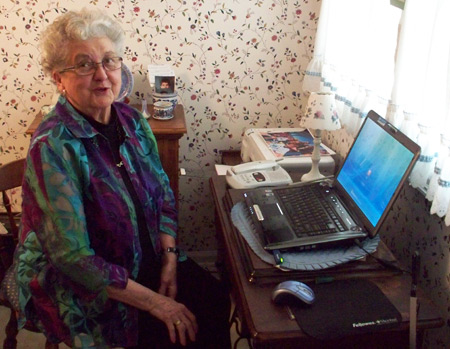
Few of us will ever be challenged the way Florence and the other passengers were. The physical challenge alone would have been too much for many of us. Add to that the emotional and mental anguish. But Florence's life was (and is) built on a sturdy foundation of faith; faith in her God to keep her safe; faith in her parents to protect her and; faith in herself. How different the world would have been if she had not survived. There would be no husband, daughter, or grandchildren. There would be no one entertaining and teaching people about this story. She would not have been there to volunteer at Hospice for 15 years, work for Gabriel or plan hundreds of weddings. 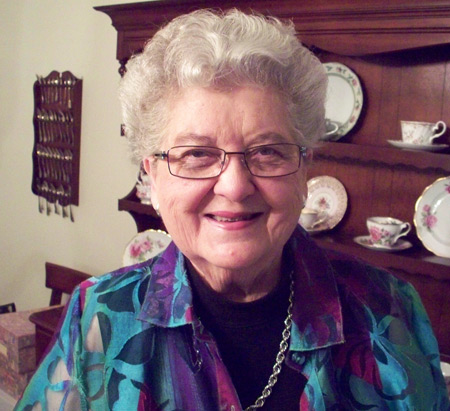
Florence, like each of us, has made a difference in the world by simply being in it. What happens beyond our mere existence is up to us. Florence chose to be a delightful woman with the gift of storytelling and making people smile and to raise a family with the same core values her parents gave to her. Florence is a survivor and we are all better off for it.
Profiled by Debbie Hanson - 2010
Top of Page
Back to Profiles of Cleveland Seniors
| 
